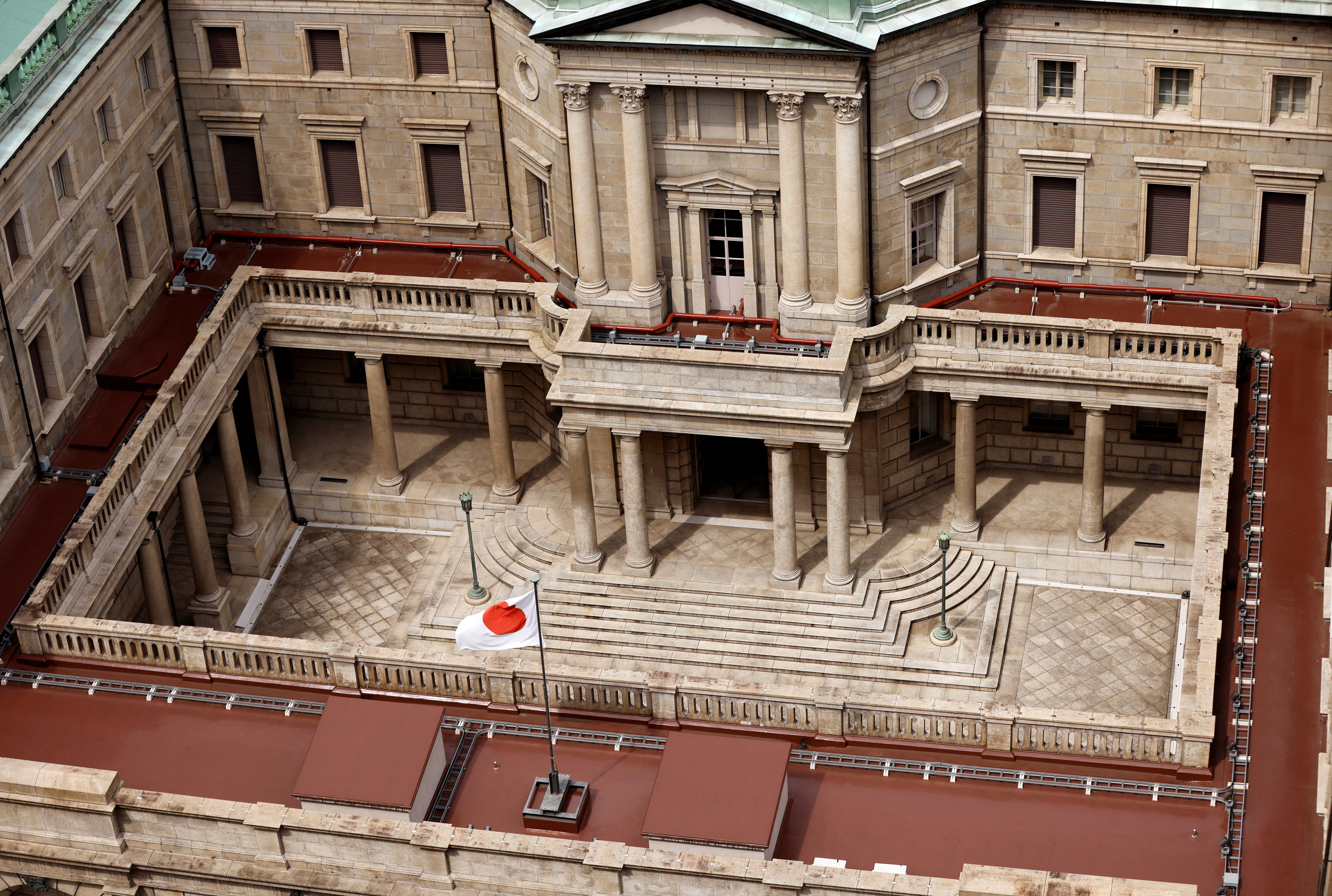By Leika Kihara
TOKYO (Reuters) -The Bank of Japan managed to calm investor nerves during global market turmoil this week by reversing a calibrated strategy to communicate steady interest-rate rises, but the flip-flop tests the bank's resolve to phase out decades of radical stimulus.
If the central bank, scarred by missteps and reversals going back a quarter century, is at the mercy of markets, it may be constrained in moving away from what it has called excessive support for the world's fourth-biggest economy.
The yen spiked and Tokyo shares plummeted last week as the BOJ unexpectedly raised its policy rate from essentially zero to the highest in 15 years and Governor Kazuo Ueda signalled further steady rate hikes, a path the central bank had been trying to suggest for months.
Ueda's influential deputy helped stabilise sentiment on Wednesday by saying the BOJ would not raise rates when markets were unstable, but confusion resumed on Thursday, when a summary of the discussion at the bank's July 30-31 meeting showed policymakers focussed on a series of rate hikes to keep inflation from overshooting.
"The BOJ hiked interest rates because it didn't like the weak yen. Now it appears to be suggesting a pause in rate hikes because it doesn't like stocks falling," said Takuya Kanda, an analyst at Gaitame.com Research Institute. "If the BOJ is watching markets so much in setting policy, there's a chance it won't be able to raise rates that much."
The Japanese currency skyrocketed on Monday and the Nikkei stock average plunged the most since 1987 after the BOJ raised its short-term policy target to 0.25% from a zero-to-0.1% range, followed by Ueda's hawkish comments. Investors were also rattled by signs the Federal Reserve would soon cut rates to buoy a slowing U.S. economy.
BOJ Deputy Governor Shinichi Uchida said on Wednesday the rout was cause for pause, as it might affect the bank's inflation projections and rate trajectory.
"As we're seeing sharp volatility in domestic and overseas financial markets, it's necessary to maintain current levels of monetary easing for the time being," he said, adding that Japan could afford to wait on hikes as inflation remained moderate.
While steadying markets, Uchida's about-face "also ended up magnifying market swings", said Kazutaka Maeda, an economist at Meiji Yasuda Research Institute. "It's undesirable for BOJ communication to cause so much volatility."
DEJA VU
Now, said economist Yoshimasa Maruyama at SMBC Nikko Securities, "the chance of a near-term rate hike is gone. In fact, the chance of another hike this year has diminished significantly."
The central bank did not respond to a request for comment on Thursday to criticisms that it is responding to market moves rather than data in setting policy. Uchida on Wednesday insisted the BOJ was focussed on the economy.
"If the market volatility changes our projection, risks and view on the likelihood of hitting our price target, then market moves would affect our decision," Uchida told a press conference after addressing business leaders. "Obviously, our goal is to achieve price stability and through that, healthy economic development. We'll pay heed to economic developments in setting policy."
Japan's ruling and major opposition parties have agreed to summon Ueda to a special parliament session this month to explain the rate hike.
In a rare public chiding, ruling Liberal Democratic Party executive and former finance ministry official Satsuki Katayama urged the BOJ on Wednesday to communicate better with markets, saying the LDP will likely discuss whether the July hike was a mistake.
The BOJ has been here before.
It raised rates from zero in August 2000, ending a then-novel experiment despite government objections. Ueda, then a policy board member, voted against ending zero rates.
Next, the U.S. tech bubble burst, hitting Japan's export-reliant economy. Eight months later the BOJ reversed course, rolling out a new experiment, quantitative easing: flooding the market with yen to support the economy and fight deflation.
By February 2007 it had raised rates to 0.5% when the global financial crisis pushed Japan into recession and forced the bank to cut rates back near zero.
In both cases, the BOJ drew fierce political criticism for phasing out stimulus too hastily.
'PREOCCUPIED' WITH ANGER OVER YEN
This time few politicians are demanding the BOJ loosen monetary policy. Days before the July hike, Prime Minister Fumio Kishida said the BOJ's policy normalisation would support economic revitalisation.
Shigeru Ishiba, a leading candidate seeking to replace Kishida in a September LDP leadership election, told Reuters he welcomed the BOJ's plan to gradually raise interest rates.
Politicians, who had long pressured the BOJ to ease policy to weaken a soaring yen to help exporters, have switched in the past two years as the currency's falls 38-year lows threatened to push inflation above the bank's 2% target.
The BOJ may pay a price if its hawkish turn is seen as succumbing to government pressure, some analysts say.
"Recent data all pointed to a weak economy, so it didn't make logical sense for the BOJ to turn so hawkish on the future rate hike path," said former BOJ official Nobuyasu Atago. "Its communication with markets could have been better."
Complicating the BOJ's task, it would be raising rates just as the Fed likely starts cutting, potentially heightening volatility in the dollar/yen exchange rate and hurting Japanese business sentiment.

The BOJ has historically avoided moving in the opposition direction to the Fed for fear of hurting exports and causing disorderly market moves, said former BOJ board member Takahide Kiuchi.
"This time, the BOJ may have been too preoccupied with public and political anger over excessive yen falls," he said. "The very timing of the BOJ's exit makes it extremely challenging to pull off in the first place."